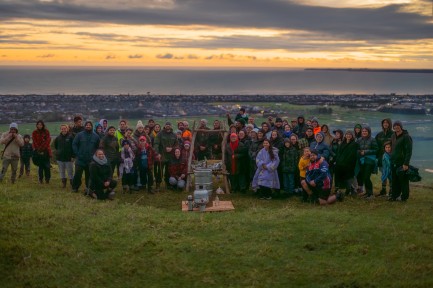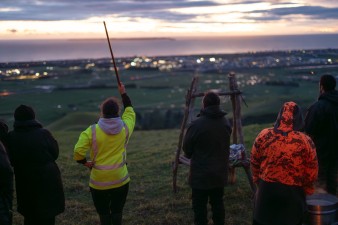OPINION: Matariki – the future of hauora for Aotearoa
 By Mereana Te Pere, Māori Health Promotion Strategist, HPF ((Waitaha-a-Hei, Tapuika, Ngāti Ranginui, Ngāti Tarāwhai))
By Mereana Te Pere, Māori Health Promotion Strategist, HPF ((Waitaha-a-Hei, Tapuika, Ngāti Ranginui, Ngāti Tarāwhai))
It’s 4.30am on a crisp winter morning and the two teenagers begrudgingly get into the car, still wiping the crust from their eyes. No rain this morning – a blessing of recent times. We park up and climb our way along the top of the mountain ridge in the pitch dark, with only our phone lights to guide us. The marama (moon) conceals her face behind some clouds, but she is there. As our eyes adjust to the glow of the moonlit sky, we feel the embrace of our tupuna (ancestors) through the sharp winds that cradle and whisper to us. I’m quickly reminded of how hideously unfit I am, but no moaning allowed!
While walking in the footsteps of our forebears, we reflect on the harsh lives they lived, the battles fought, and those who’ve fallen to protect our mana motuhake. So be grateful and keep going Mereana! We reach the top pā site and join the rest of the whānau and community huddling around the fires, waiting for the umu kohukohu whetū (welcoming Matariki) ceremony to begin.

This year marked the first umu kohukohu ceremony to be held by the Waitaha-a-Hei iwi (Bay of Plenty) in likely over 100 years. (Pictured right, Waitaha a Hei – Photo courtesy of Te Kapu o Waitaha)
Like many other iwi around Aotearoa, the work of Dr Rangiānehu Mātāmua (Tūhoe, Ngāti Pikiao), Jack Thatcher (Ngai Te Rangi, Waitaha, Ngāti Ranginui, Ngāti Pūkenga, Te Aitanga-a-Hauiti, Ngāti Awa, Ngāti Porou, Ngā Puhi), Wiremu Tāwhai (Te Whānau a Apanui, Te Whakatōhea, Ngāti Awa) and other Māori experts has sparked a modern renaissance of Māori knowledge, practice and ceremony. Another big feat was securing Matariki as a public holiday for all New Zealanders from 2022.
As the nation settles into normalising celebrating and entrenching Matariki, for Māori it is a catalyst for deep reconnection to the atua (deities) and spiritual realm. Boosted by the (mostly) positive messaging and resourcing on all media platforms, Māori now have more access and opportunity to their history and culture than ever before. But the extra sweetener is that non-Māori have time and opportunity to jump on the waka too.
Matariki can be a conduit that binds all people in Aotearoa together. Each year communities will come together and take time to reset. My first umu kohukohu whetū ceremony has shown me that unifying the efforts of all people – koeke (elderly), rangatira (leaders), kaikarakia (person who recites prayer), kura (schools), council, whānau, etc and lifting their/our collective consciousness to reach spiritual connectedness and harmony is totally possible.
And it’s not just a case of ‘you had to be there’, but actually ‘you can be there - each and every year in fact’. We are undergoing a cultural shift, and Matariki are our guiding stars towards achieving spiritual elevation as a nation of people. With strong, consistent, and compassionate leadership from our Māori rangatira (leaders), and open-heartedness from our communities – our concerted efforts will cultivate a united society that can connect to the cosmos and collectively amplify the quality and meaningfulness of our lives.

(Left, Karakia at the umu kohukohu whetū. Photo courtesy of Te Kapu o Waitaha)
Matariki also holds the blueprint for healthy practices. We live in a time plagued with constant threat of natural disasters and economic insecurity. We must look to the stars of te kāhui (cluster) Matariki and honour the relationship these atua have with the natural resources to mend the harm and violations committed upon Papatuānuku (earth mother). Without her and her children we are nothing. We become orphans. How many homes must be swept away before we change? How many marae must be buried in mud before we do something about it? How many ocean and land creatures must die off before we starve and finally wake up to the fact, we were too narcissistic and selfish to change. Now is the right time for dramatic change. We can, no – we MUST look to our deities like Waitī and Waitā to become protectors of the taiao (environment). Our modern values and lifestyles of consumerism, capitalism, ‘I want it now’ and ‘take take take’ are destroying the interconnectedness of all of nature’s creatures – including us.
Looking to Matariki and the maramataka (Māori lunar calendar), and embracing its practices and teachings is our opportunity to change the negative trajectory. Matariki has the answers and strategies we need to live our best lives. We can learn from the actions of our gods. We are remnants of them after all. We can emulate their processes to thrive, even in this technology-driven world. As kaitiaki we are obligated to make the best decisions and actions for our descendants. Last thing I want is for my uri (descendants) to denounce me for not doing enough. Now is the right time for dramatic change.
Matariki is the spark we have all been waiting for. For Māori, we are all on our own journeys to reclaiming our culture. Some are more advanced in that voyage than others. Some of us are still fledglings, but that’s okay. Matariki is the window to our past, the connection to the present, and our dreams for the future all in one. Take this opportunity to lead our people, and all people towards hauora.
For non-Māori whānau (family), Matariki is your invitation and open door to our world. Witness an umu kohukohu whetū ceremony. See, hear, smell, feel and taste the connection to the beyond. To something greater than us. Matariki is for all of Aotearoa. Let Matariki be the vessel towards hauora for us all.
(Banner photo - Dawn at the umu kohukohu whetū. Courtesy of Bay of Plenty Regional Council.)